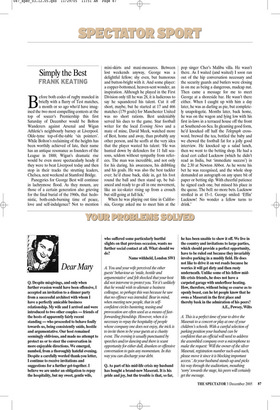Simply the Best
FRANK KEATING
Before both codes of rugby muscled in briefly with a flurry of Test matches, a month or so ago who’d have imagined the two most compelling contests at the top of soccer’s Premiership this first Saturday of December would be Bolton Wanderers against Arsenal and Wigan Athletic’s neighbourly barney at Liverpool. Olde-tyme top-of-the-table ‘six pointers’. While Bolton’s reclaiming of the heights has been worthily achieved of late, their name has an antique resonance as founders of the League in 1888; Wigan’s dramatic rise would be even more spectacularly heady if they were to beat Liverpool today and then stop in their tracks the strutting leaders, Chelsea, next weekend at Stamford Bridge.
Panegyrics for George Best will continue in lachrymose flood. As they mourn, are those of a certain generation also grieving for the final burial of the 1960s, that hedonistic, both-ends-burning time of peace, love and self-indulgence? Not to mention mini-skirts and maxi-measures. Between lost weekends anyway, George was a delightful fellow; shy even, but humorous and button-bright with it. And some player: a copper-bottomed, heaven-sent wonder, an inspiration. Although he played in the First Division only till he was 28, it is ludicrous to say he squandered his talent. Cut it off short, maybe, but he started at 17 and 466 matches (179 goals) for Manchester United was no short rations. Best undeniably served his dues to the game. Star football writer for the local Evening News and a mate of mine, David Meek, watched more of Best, home and away, than probably any other person, and he scoffs at the very idea that the player wasted his talent: ‘He was hunted down by defenders for 11 full seasons, seldom without sympathy from referees. The man was incredible, and not only for his daring, his awareness, his dribbling and his goals. He was also the best tackler ever; he’d chase back, slide in, get his foot round the ball and then stand up, be balanced and ready to go all in one movement, like an ice-skater rising up from a crouch but still going at full lick.’ When he was playing out time in California, George asked me to meet him at the pop singer Cher’s Malibu villa. He wasn’t there. As I waited (and waited) I soon ran out of the hip conversation necessary and the security guards and butlers were closing in on me as being a dangerous, madcap nut. Then came a message for me to meet George at a shoreside bar. He wasn’t there either. When I caught up with him a day later, he was as darling as pie, but completely unapologetic. Months later, back home, he was on the wagon and lying low with his first in-laws in a terraced house off the front at Southend-on-Sea. In gleaming good form, he’d knocked off half the Telegraph crossword, brewed the tea, bottled the baby and we chewed the football fat for a jolly good interview. He knocked up a salad lunch, then we went to the betting shop. He had a dead cert called Lucknow (which he didn’t read as India, but ‘immediate success’) in the 2.30 at Newton Abbot. As he wrote his bet he was recognised, and the whole shop demanded an autograph on any spare bit of paper or betting slip. With cheerful patience he signed each one, but missed his place in the queue. The bell: no more bets. Lucknow strolled in at 15–1. George smiled: ‘Effin’ Lucknow! No wonder a fellow turns to drink.’



























































 Previous page
Previous page